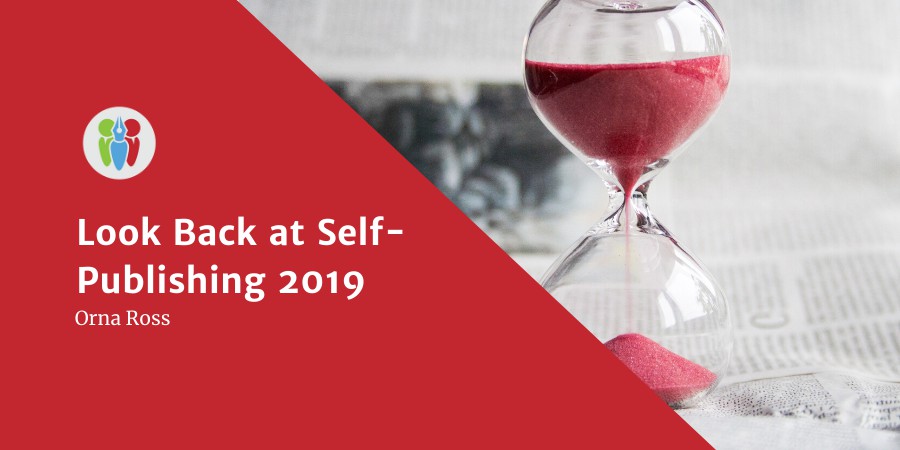As we draw into the final few weeks of the year, and the decade, we're feeling reflective at ALLi. Orna Ross ALLi Director, takes a look back at self-publishing in 2019, the ins and outs, highs and lows, and this evening in our Advanced Self-Publishing Salon she and Joanna Penn will look back over what has been an incredible decade for indie authors.

ALLi Director, Orna Ross
The turning of the year gives us the opportunity to look back and reflect, look forward and plan. Next month, I'll blog ALLi's predictions for 2020 and the 2020s decade but right now it's time to examine the self-publishing landscape at the end of this year. And at the end of this decade, which has seen such significant changes for self-publishing authors.
Of course, it was Amazon who kicked off self-publishing 2.0 just over a decade ago with the almost simultaneous introduction of the kindle reader, online retail bookstore and Kindle Publishing Direct, their innovative and authorcentric self-publishing platform. Ten years on, in 2019, many authors who publish exclusively with Amazon have had a confusing and frustrating year, as what appeared to be changes in the algorithm led to a drastic reduction in income for some.
Of course, it's impossible to say what's right for any individual writer's particular circumstances–by definition, each indie author is the creative director of their books and business–but ALLi has long argued that, all other things being equal, serious indie authors do better over the long term with a non-exclusive model.
Everything that happened in our sphere in 2019 confirmed the wisdom of this self-directed approach, which we call Self-Publishing 3.0 as the most sustainable and scalable option for the majority of authors. For those who in industry parlance “go wide”, i.e. publish in a variety of formats and on a variety of platforms, not least their own websites, 2019 saw self-publishing open more promising and exciting opportunities than ever.
Look Back at Self-Publishing 2019: eBook Distribution
Distribution and marketing platform PublishDrive had an amazing year, introducing–among many innovations– a new ebook conversion tool, an author collaboration and price splitting tool, a new book categorization tool using AI, and a new pricing option that allows authors to keep all of their royalties.
Draft to Digital added audiobook links to its popular universal links page and further extended library distribution possibilities with Hoola. While the other “wide” distributor that indies need to connect to–Streetlib–added a sophisticated analytics board and in October set up a fantastic Publish Global B2B magazine. A must-read for all indie authors who are serious about self-publishing, with the redoubtable Mark Williams at the editorial helm.
Subscription models continued to grow but, as ALLi's new editor Dan Holloway reported, there are rumbles of discontent. Holloway emphasizes the need to ensure that terms of service are right from the start.
Rakuten Kobo stepped up opportunities for indies in libraries through its new ownership of Overdrive. As many trade publishers and academic publishers are in a standoff with libraries in the US, indie authors are availing of the opportunity for discoverability (and in some cases income) that libraries represent.
Look Back at Self-Publishing 2019: Print book Distribution
Print, as ever, was more complex than ebooks. In May, Baker & Taylor decided to exit the retail book distribution business in the US, to expand its role with public libraries instead. This led to closed warehouses and books being returned to many publishers, including indie authors. B&T's subsidiary businesses in the U.K. and Mexico are, so far, unaffected.
This leaves Ingram Spark as the only major print book distributor in the US. Thanks to its founder Robin Cutler, who worked at Amazon in the years when the Kindle and Createspace were conceived, the Spark team has always understood self-publishers' needs more than any other major print book distributor. Under her leadership, the platform continued to improve its website and services in 2019, and consolidated its position as one of two key distributors for indies who publish print, the other being KDP Print, and the two best used together.
In October, bookseller supremo James Daunt took over the beleaguered American bookstore chain, Barnes & Noble, while keeping his CEO position at UK chain Waterstones. His strategy for reviving the flagging American stores is the same he used to turn Waterstones around, and one all good author-publishers already adopt (“…simple. Fill bookshops with the books their customers want”).
His main focus will be on improving B&N’s physical stores (“If you improve the stores, everything else will rise.”) Of more interest to most indie authors, who sell far more online, are his plans for Nook, the self-publishing arm of B&N, which despite its challenges remains the second-best bookselling platform for many self-publishers in the US.
Speculation was rife that Nook would be axed–a new Nook introduced in October has received a mixed reception– but he has confirmed that he has no plans to discontinue the platform. And he expects B&N.com's performance to improve as stock selection and content presentation improves, together with bringing online purchase and store pick-up together. We wish Mr Daunt good luck in reviving the fortunes of the world's largest https://www.allianceindependentauthors.org/self-publishing-3-0/seller of print books through physical stores.
Look Back at Self-Publishing 2019: Audiobook Distribution
Whether it’s the audiobook or voice assisted technology, the audio boom continues. Converting their backlisst to audio is holding much of trade publishing afloat and indies are finding it a lucrative platform too. Although the cost of production is prohibitive for some in the earlier stages of their author business, 2019 saw an increase in indie authors seizing the audioopportunity.
Finadaway Voices had a great year in 2019, and now offer more than 40 audiobook retailers and library platforms where authors can sell audiobooks and reports on authors who are now doing audiobook first.
ACX continues to be the best audio option to access the Amazon store and they introduced a new payment option, Royalty Share Plus, whereby authors can invest in production costs and access a greater community of audiobook producers. Using Findaway and ACX together, on a non-exclusive basis, is the way to reach most readers in most territories.
Look Back at Self-Publishing in 2019: Marketing
Bookbub, the premier and most expensive ebook marketing platform, launched Chirp, to do for audiobooks advertising what they've done for ebooks (US only for now). Also in the audiobook sphere, good news from Google around the indexing of podcasts, making them easier to find and giving authors a way to market their audiobooks.
Amazon KDP opened its advertising platform (now called Amazon Advertising) in the UK and Germany, resulting in a spike in advertising costs for authors in September, though this now appears to have settled back down. At the very end of the year, KDP announced more improvements to its advertising platform.
A number of author-facing marketing services started in 2019 but many were of questionable value. Email marketing combined with effective social media and/or digital advertising remains the best way to reach and grow the sort of readership that provides a successful author business.
Look Back at Self-Publishing 2019: Rights Licensing
We had more author conversations about selective rights licensing in the community this fall. Mark Dawson got a good print rights deal from a trade publisher, the kind that is most advantageous for an author with a good ebook readership. We expect to see more of these deals
The wonderful Kristine Katherine Rusch and Dean Wesley Smith announced the demise of their renowned business masterclass with a session on licensing that shows how this can be a game-changer for indie authors who adopt a selective rights-licensing mindset. This means dropping the dualistic divide between trade publishing and self-publishing and understanding the value of your intellectual property and how copyright is working for you, something that was top of mind for ALLi when we launched a Copyright Bill of Rights for Authors guide this year.
Right now, ALLi is conducting a rights licensing experiment, the Indie Author Rights program, that is taking six authors through the process of preparing to pitch translation rights at the London Book Fair.
Look Back at Self-Publishing 2019: New Technologies
People have been talking about the future of artificial intelligence in publishing for some years now but this year, we saw that the future is here. Early indie adopters like Joanna Penn and Michael Anderle are starting to use AI for translations. We are also exploring its use in audiobook narration and more.
More on this, and on other technologies like blockchain, in next month's look forward to 2020 and beyond.
Look Back at Self-Publishing 2019: ALLi’s SelfPub3 Campaign
Whatever happens in the fast-changing world of self-publishing, you don't have to mindlessly follow along, or feel so overwhelmed that you don't know how to proceed. ALLi is here to help you retain your freedom and control and take advantage of all that SelfPub3 has to offer.
Whether it's making a great book, reaching more readers, monetizing your rights, or creating a great transactional website on which you can sell direct, our community of authors who have been there and done that are unfailingly generous with their time and expertise. And our team is here to support you through your personal challenges.
If you haven't already, is it time you joined us?
A look at 2019's year of self-publishing @ornaross #indieauthor #selfpublishing #IARTG #ASMRG #writingcommunity Share on XOVER TO YOU
What do you think the most significant developments have been for self-publishing in 2019?
If you enjoyed this post, you might like these from the ALLi archive:




